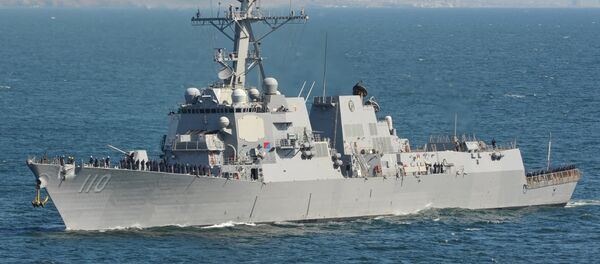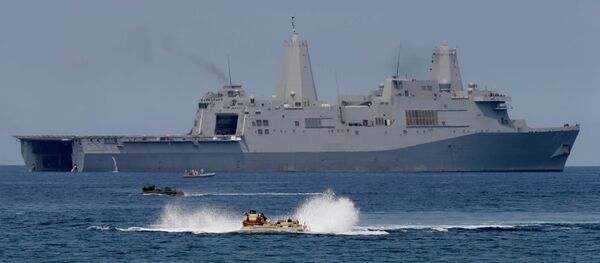On Tuesday the USS William P. Lawrence conducted the US' third South China Sea freedom of navigation operation (FONOP); however, the warship transited under "innocent passage" within twelve nautical miles of Fiery Cross Reef, Zack Cooper and Bonnie S. Glaser of the Center for Strategic and International Studies note, calling for more assertive actions in the region.
"The FONOP surprised many observers by targeting Fiery Cross Reef. Both of the previous FONOPs were conducted as innocent passages because they were directed against features that are entitled to territorial seas under the United Nations Convention on the Law of the Sea (UNCLOS)… The recent Fiery Cross Reef FONOP was similar to these two previous operations, in that the William P. Lawrence transited under innocent passage within twelve nautical miles of the reef," the US scholars write in their article for the National Interest.
Cooper and Glaser argue that Washington had to target Mischief Reef, thus far delivering a "stronger signal" to Beijing.
"Some experts looking for a stronger signal of US resolve in the South China Sea had hoped that after the first two FONOPs, Washington would target Mischief Reef to show that the United States will not treat low-tide elevations as rocks or islands simply because China has created land on top of them," they stress.
Indeed, during a press conference on May 10, 2016, China's Foreign Ministry spokesperson Lu Kang pointed out that "on May 10, without permission from the Chinese government, the USS William P. Lawrence destroyer illegally entered waters near the relevant reef of China's Nansha Islands [the Spratly Islands]," adding that "China has indisputable sovereignty over the Nansha Islands and the adjacent waters."
"For a long time, the freedom of navigation and overflight in the region has been upheld thanks to the cooperative and concerted efforts by China and relevant coastal countries in the South China Sea. In fact, the freedom of navigation and overflight and the passage of vessels of all countries have never met any obstacle," Lu Kang emphasized.
The Foreign Ministry spokesman drew attention to a paradoxical situation: while beating the drums over the significance of freedom of navigation in the South China Sea, Washington still avoids ratifying UNCLOS itself.
"To this day, the US still drags its feet in joining UNCLOS. It is because the US places its own interests above international law," Lu Kang noted.
The experts shed light on the string of events that led to the recent tensions between Washington and Beijing in the South China Sea. They underscored that China has no motive to seek hegemony in the region and explained why the issue of territorial integrity is of ultimate importance to the Chinese.
"To observe China, one should never lose sight of the historical dimension. Though China is growing into a strong country, the painful memory of history is not long gone. The Chinese people have not forgotten that the country stumbled into the 20th century with its capital under the occupation of the imperialist armies, and for over a century before and after, China suffered the humiliation of foreign invasion and aggression," they stressed.
Beijing is interested in preserving peace and stability in the region as well as the freedom and safety of navigation and here China and the US' interests overlap, the experts noted.
They warned American policymakers against falling into the trap of misunderstanding and called for dialogue on the matter.
"China and the US and are not disputing parties to each other. Therefore, the two countries should avoid the trap of security dilemma and misunderstandings by engaging in dialogues and clarifying each other's intentions. China and the US need and should be able to work towards cooperation," Fu Ying and Wu Shicun emphasized.
Neither Washington, nor Beijing would benefit from a potential conflict over the South China Sea, the experts concluded.



